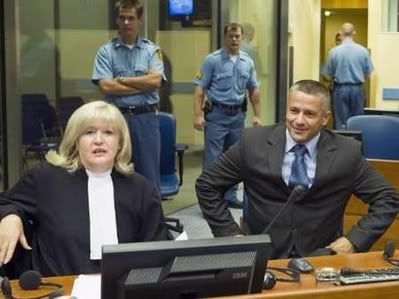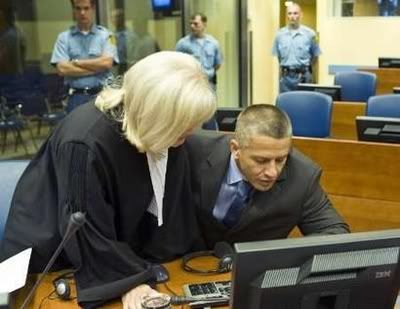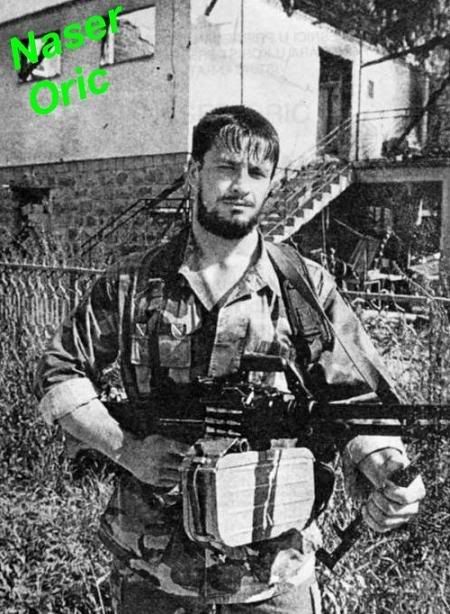 THE HAGUE, The Netherlands (July 3,2008) - A U.N. appeals court today overturned the war crimes conviction of Bosnian war hero Naser Oric,the commander of the Bosnian Army in the eastern Bosnian town of Srebrenica,during the 1992-1995 Serbian aggression against Bosnia.
THE HAGUE, The Netherlands (July 3,2008) - A U.N. appeals court today overturned the war crimes conviction of Bosnian war hero Naser Oric,the commander of the Bosnian Army in the eastern Bosnian town of Srebrenica,during the 1992-1995 Serbian aggression against Bosnia.Oric,41,had been convicted in 2006 of failing to prevent subordinates from killing six genocidal Serbian fascist aggressor's soldiers captured and held by the Bosnian Army in 1992 and 1993 in Srebrenica.
However,judges gave him a lenient two-year sentence and ordered his immediate release because of time spent in custody.
But appeals judges went even further, overturning both convictions because the original trial failed to establish that Oric had control over Bosnian forces responsible for the killings of six captured genocidal Serbian fascist aggressor's soldiers.
"The appeals chamber reverses Naser Oric's conviction," said judge Wolfgang Schomburg of the International Criminal Tribunal for the former Yugoslavia, (ICTY) based in The Hague.
The court emphasized that "proof that crimes have occurred is not sufficient to sustain a conviction of an individual for these crimes."
The court criticised the fact that the perpetrators then had not been sufficiently identified. So it could not be proven whether they had in fact been under Oric's command.
Oric stared ahead without showing any emotion as the judgment was read and then bowed briefly to judges before sitting down. Outside court, he hugged friends and his lawyer before walking out the front door a free man.
"Of course I am very happy," he said.
His lawyer, Vasvija Vidovic, said the acquittal was no surprise.
"Anyone who followed the trial could expect the result that he is not guilty," she said.
Oric said he was not bitter about spending nearly three years in pretrial custody, only to ultimately be found not guilty on all charges. "It was my destiny," Oric said.
Oric led the heroic defense of the Srebrenica enclave against attacks from the genocidal Serbian fascist aggressor's forces from early in the war. In 1995, the genocidal Serbian fascist aggressor's forces stormed a U.N.-declared "safe haven" in Srebrenica and mass murdered some 10,000 Bosnian civilians,which was Europe's worst civilian massacre since World War II.
Oric defended the actions of all Bosnian soldiers in the enclave, saying they were in a desperate situation.
"I don't think they really committed crimes," he said outside court. "We were under siege. We were just fighting to survive and fighting for our lives."
One of the genocidal Serbian fascist aggressor's commanders,Serbian war criminal Radoslav Krstic, has already been sentenced to 35 years after a conviction on genocide charges.
The commander of the genocidal paramilitary fascist forces of the Serbians living in Bosnia (VRS), Ratko Mladic - also charged with genocide for the Srebrenica mass murders - is believed to be hiding in the genocidal Serbia.
Munira Subasic, head of the Mothers of Srebrenica Association, said Oric's innocence was obvious from the start.
"He was himself the victim of genocide" as 22 members of his family members had been murdered by Serbs, Subasic said.
"The fact that the court even indicted him for war crimes made us all believe it had become unjust."
In March 1995 Naser Orić was awarded the "Golden Lily", the highest award given by the Chief of Staff of the Supreme Command of the Bosnian Army.

Bosnian war hero Naser Oric (R) and his lawyer Vasvija Vidovic sit in the courtroom of the International Criminal Tribunal for the former Yugoslavia (ICTY) as he waits for the judgement on his appeal in The Hague July 3, 2008. Oric, wartime commander of Srebrenica, was acquitted of all war crimes charges including the killings of six genocidal Serbian fascist aggressor's soldiers captured and held by the Bosnian Army in 1992 and 1993 in Srebrenica.

Bosnian war hero Naser Oric, right, and his lawyer Vasvija Vidovic, left, are seen in the courtroom of the Yugoslav war crimes tribunal in The Hague, Netherlands, Thursday July 3, 2008. A U.N. appeals court has overturned the war crimes conviction of Oric and acquitted him of all war crimes charges including the killings of six genocidal Serbian fascist aggressor's soldiers captured and held by the Bosnian Army in 1992 and 1993 in Srebrenica.

Bosnian war hero Naser Oric smiles as he leaves the ICTY building after his release in the Hague July 3 2008. The U.N. war crimes tribunal in The Hague on Thursday overturned the conviction of the commander of the Bosnian Army in the eastern Bosnian town of Srebrenica,during the 1992-1995 Serbian aggression against Bosnia.

Bosnian war hero Naser Oric, the former commander of the Bosnian Army in Srebrenica, is photographed near Tuzla in 1995.In March 1995 Naser Orić was awarded the "Golden Lily", the highest award given by the Chief of Staff of the Supreme Command of the Bosnian Army.
.






